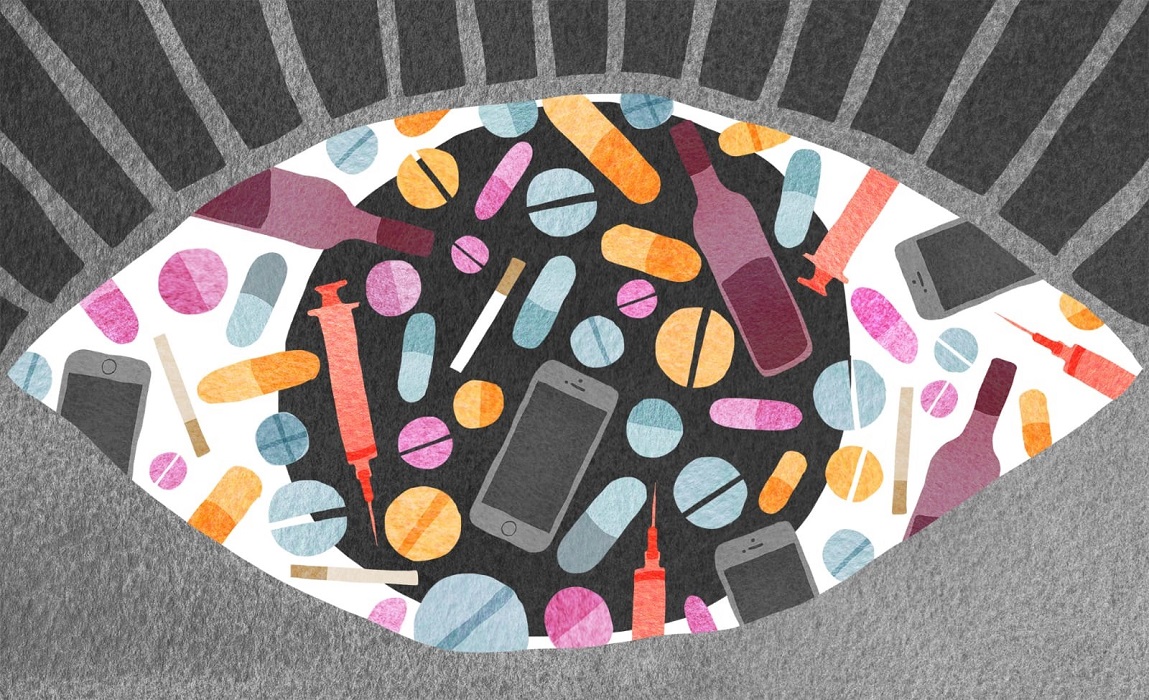We are all addicted. Society is organized in such a way that at any given moment in our lives, we become addicted to something: things we are used to do or consume from childhood, certain food, a way of thinking or behaving and different forms of entertainment, to name a few. In short, we become addicted to any pattern learned at home during our upbringing or developed throughout our lives from the environment. All these conditions construct what we are and what we are prone to, defining our tendency to potential addictions, including deadly ones. If that is the case, how can a person be liberated from a harmful dependency?
Harvard Medical School defines addiction as a “loss of control over indulging in a substance or performing an action or behavior, and continued craving for it despite negative consequences.” In fact, those adverse results are affecting a whole generation. The opioid epidemic, for instance, causes 155 deaths every day in the United States. Although dramatic and worrisome, it is only the peak of the iceberg. An estimated 40 million Americans ages 12 and older abuse or are addicted to nicotine, alcohol or other kind of drugs, surpassing the number of people with heart problems, diabetes or cancer.

A New World, New Addictions
Tech dependency can also have an impact on how we function, developing symptoms similar to substance abuse. Gaming addiction, for instance, has been classified as a mental health condition by the World Health Organization. In addition, 50% of young people admit cell phone addiction while Americans in general spend an average of 5 hours a day browsing, according to recent studies.
Regardless the source of dependency, the common denominator is the yearning for detachment, even temporary, from troubles, pressures, competition and other negative influences from the surrounding circles we might be exposed to: family, school, work and society.
Pursuing an alternative reality is a consequence of human nature. We are made from an insatiable desire to enjoy that constantly grows and renews itself, leaving us empty when it is unfulfilled, leading us to various addictions to fill the void. As those cravings transform into a habit, one constantly needs larger doses, entering a vicious circle. This is an unsuccessful way of coping.
Why do people resist calling these examples addictions? It is because they are so immersed in a certain way of living that it seems natural, but when they lose control of their lives they try to get out of the trap and find it extremely difficult, if not impossible. It is at this point when a person descends to a vegetative level, suppressing the internal desire for a higherpurpose in life — unique to the human level, the most developed in nature — instead of filling it.
Looking for the Drug of Joy
People lack the elixir of life, the drug of happiness. Therefore, we face not a drug problem, but an emptiness problem. If our nature is a desire to receive, and this desire is not provided, it transforms into a negative escape mechanism.
A person is a result of the environment. Therefore, it is important to see it as the overriding factor for human change. Such transformation is possible by isolating the individual from the surroundings that triggered the addiction and replacing them with positive support circles that will help the person reshape the previous dangerous habits into positive ones. It is the equivalent of setting up a new program that will need to complement and bring more satisfaction to the person than the artificial sensation obtained through substance abuse or any other kind of unhealthy dependency.
Our Relations Rehab
I am referring to a comprehensive treatment that needs to target an underlying multifaceted problem. That is to say, we have to create new conditions according to every person’s cultural and social background and needs. In some cases, it will possibly require a rehab medical plan but it should always include the remedy to all our troubles, the drug of life, which is based on positive connection among people. A positive social environment can rehabilitate us and help us to evolve to a higher level of existence.
Such a new level of positive social connections is what evolution is pushing us to attain. In order to realize such connections, we first need to educate about and promote the idea that only through warm, safe and supportive connections, human society can achieve the kind of satisfaction it is constantly craving for. Then, we will be aware of the fact that the only dependency we need to be hooked on is realizing our interdependence in a positive way.
That is the way nature has created us, humans, as part of an integral and interrelated system that should work harmoniously and balanced through mutual care and consideration. By realizing and implementing such relations, we can enter into balance with nature and discover a much greater kind of fulfillment as a result.


